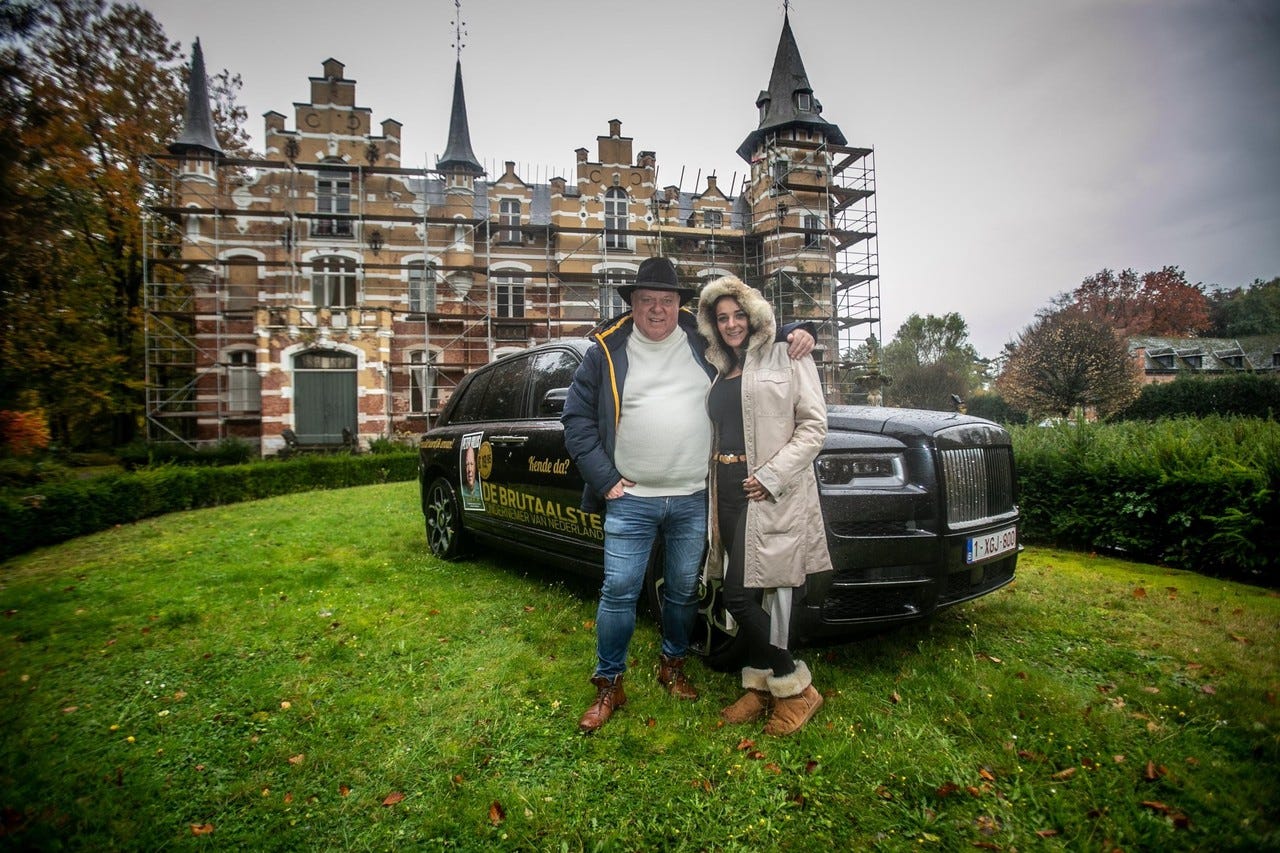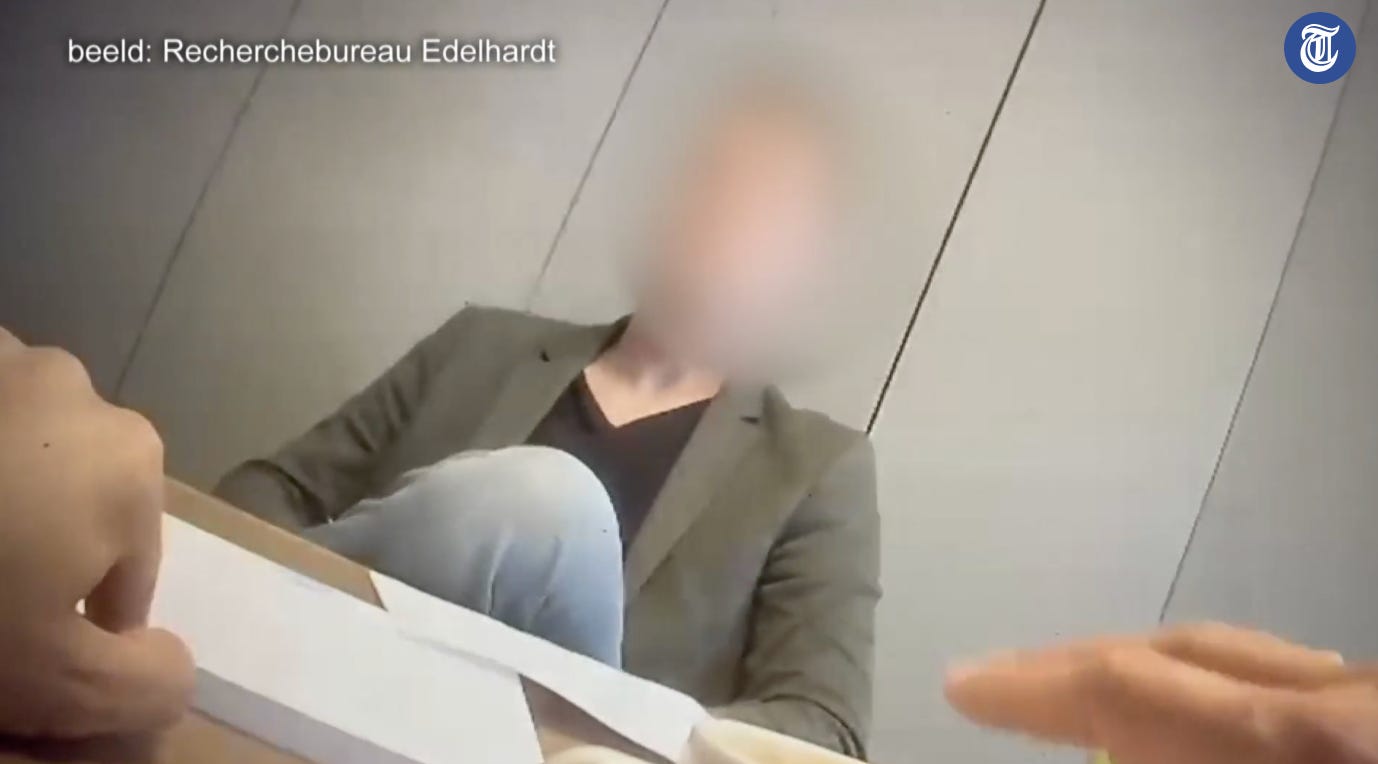Dutch holiday parks are hotbeds of crime
How a flashy reality TV star brought the shady "camping mafia" to light

This summer, reality TV star Peter Gillis—one of the biggest operators of holiday parks in the Netherlands and Belgium—was charged with tax fraud.
This is only the latest of his legal woes.
Others include a one million euro fine for illegally housing migrant workers, being designated as an “alleged criminal entrepreneur,” a possible fine 10,000 euros for not preventing prostitution in his parks, possessing an illegal hand gun, and assaulting his ex-girlfriend. The list goes on.

On his program Massa is Kassa, Gillis drives a Rolls Royce, downs saucijzenbroodjes (sausage rolls), lives in a castle, and “brutally” runs his business. On average 650,000 people watch each episode of his show. He’s a big time celebrity, and he’s rich.
With all of his self-promotional activity, Gillis put a flashy public face on the otherwise shady “camping mafia” which operates out of quiet chalets in Dutch holiday parks.
So where did he make all of his money?
So many holiday parks!

Today there are about 5,000 holiday parks in the Netherlands. They typify the “the government's compulsion to organise everything in the Netherlands,” according to historian Mieke Dings.
That we have so many is the result of deliberate spatial planning and government subsidies, going back to the 1920s.
The government wanted to encourage people from towns and cities to discover nature. However, it was scared to death of isolated summer houses in the landscape. And this is why they structurally encouraged the building of holiday resorts.
Since the 1980s local governments have encouraged the development of holiday parks more to generate tourist revenue than stimulate nature exploration.
The Gillis Method
Investigative journalists Jelle Krekels and Chiel Timmermans discovered how Peter Gillis was able to buy that Rolls Royce and castle: he “systematically breaks rules and earns a lot of money in the meantime.”
By using his holiday parks for illegally housing labor migrants—who come to the Netherlands largely from Eastern Europe—Gillis saves a ton of overhead. Labor migrants don’t require any of the amenities that tourists do—no swimming pool, no restaurant, no website, no marketing, etc.
This is all illegal because permanent residence at holiday parks is not allowed.
So Gillis houses migrants in trailers, waits the several years it inevitably takes for rural municipalities to discover the residents, and waits for his fines and/or charges to roll in. Meanwhile, he pockets millions of euros.
To make it all extra gross, when he’s finally busted, he tells the municipalities—you don’t want migrants housed here? No problem. He’ll just kick them out onto the street.
Large-scale money laundering

A few conditions make Dutch holiday parks ideal for money laundering.
Individual chalets within holiday parks are not listed in the national Land Registry—therefore the sales happen out of view of the authorities.
Which means that you can buy a chalet in cash and not report it… unlike every other conceivable real estate purchase in the Netherlands. Some criminal organizations have bought entire vacation parks, which is possible since operating permits aren’t required.
In 2021, a private detective approached an employee of TopParken saying he wanted to buy some chalets with, in part, 82,000 euros in cash in black money from Italy. Caught on tape, a TopParken employee said that was no problem—they do that kind of thing all the time.
A holiday for criminals

Holiday parks offer drug criminals quiet, comfortable homes from which to run their operations. The authorities have no idea who’s staying in the parks or for how long they’ve been there.
In 2020, the “most wanted man in Brabant” was arrested at Bospark Ede after a week and a half-long stay with a fully loaded firearm; dozens of XTC pills, amphetamine, and crystal meth; a van with thirty barrels of drug-production chemicals; and ten mobile phones.
Ahmed Marcouch, mayor of Arnhem, advocates for a “national approach” to this kind of crime. Marcouch withdrew Peter Gillis’ permit for Holiday Park Arnhem this year. This is one of the main tools municipalities have to combat holiday park crime, and others threaten to follow suit.
The Dutch part
Why go on television year after year and document how you spend all of your fraudulently acquired money?
Gillis joins a very long list of American “real housewife” fraudsters. This whole story reminded me of a 2021 analysis from Brian Moylan in NBC News:
There is definitely an overlapping in the Venn diagram between good reality TV and a certain kind of crime. To be a good Housewife requires performativity, narcissism, a comfortability with risk, charisma, self-mythologizing and often a little bit of aggression. Those are, I assume, some of the very same qualities it takes to lead a life of financial crimes.
But the most famous Dutch reality TV fraudster is not a glamorous housewife in head to toe knockoff Gucci, rather a saucijzenbroodje-guzzling “teddy bear” from Brabant.
I think this speaks to the self-mythologizing necessary for mainstream reality TV fame in each country. Americans admire people with money who look rich no matter where their money came from; the Dutch admire people with money who don’t look rich but are… and manage to make it look like it their money came for a humble, modest source.
Like holiday parks.
Which, as we now know, are actually amongst the shadiest ways to make money in the Netherlands.
A new season of Massa is Kassa is going foward with another season this fall.
🥳 Leuke Dingetjes
The camping mafia on Netflix
There’s a great Netflix series about how a drug kingpin’s life is upended when two undercover police officers move in to his holiday park. It’s one of the best Dutch-language series I’ve seen.
A new track from Gildor
Now that it’s suddenly fall 😭 I’m enjoying this Dutch indie folk. In the rain. Already.
*all typos in this post are definitely deliberate




Dang! Who knew!?
Can I request your next piece be on why the Dutch all seem to love black toilets all of a sudden? I had to use one in a cafe today and it was traumatic.